The banners were unfurled and drums and gongs rang in celebration. Hundreds of delicacies were prepared, coconut water and grape juice overflowed, and they all feasted for a long time. They continued as before with the military exercises. The Monkey King appointed the four old monkeys his top advisors. The two red-buttock monkeys he named Marshals Ma and Liu. The two bare-backed monkeys he named Generals Ba and Beng. All of the day-to-day exercises of the army, doling out of rewards and punishments, he left to his four advisors.
After that, he ceased to worry;1 each day he soared with the clouds and mist, toured the four seas, and sought pleasure in a thousand mountains. He practiced his martial skill, visited heroes, worked magic, and made friends everywhere. He formed a brotherhood of seven: the Bull Demon King, the Dragon Demon King,2 the Roc Demon King3, the Hunched Lion King,4 the Macaque King, the Winged Ape King5 and of course our very own Handsome Monkey King made seven. All day the sworn brothers discussed philosophy and debated strategy, exchanged toasts and gifts, sang and danced at banquets. Wukong would leave at dawn and return at dusk, leaving no pleasures unexperienced. To Wukong, the journey of ten thousand li6 was as the walk to the front gate. They say he traveled three thousand li7 with a nod of his head, and made a journey of eight hundred li8 with a twist of his hips.
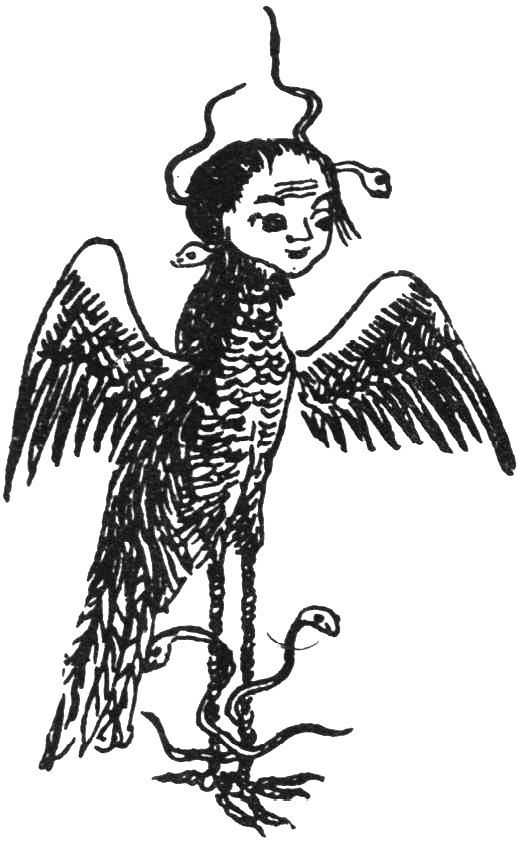
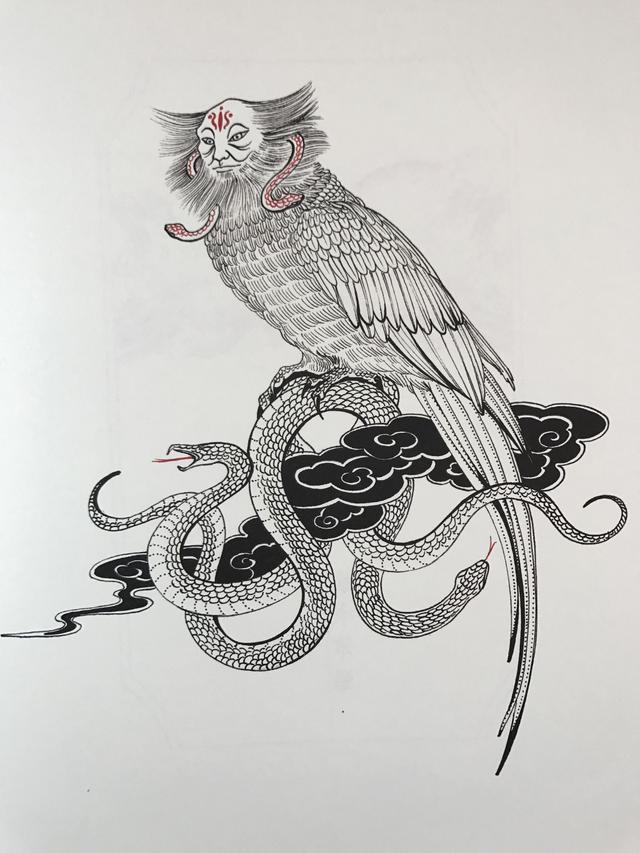
One day, Wukong instructed the four advisors to prepare a great banquet for the six demon kings. They butchered cows and slaughtered horses and made offerings to heaven and earth. The assembled yao danced and sang, and they feasted until the entire assembly was blackout drunk. After Wukong had escorted the six kings out and rewarded his loyal advisors, he suddenly fell asleep as he was leaning on the iron bridge under the shade of some pine trees. The four advisors gathered around him, not daring to make any noise and wake him. In his sleep, the Handsome Monkey King saw two men come before him bearing an official-looking document bearing the name Sun Wukong. Without explanation, they came up to him, tied a rope around him, and hauled away his spirit. Staggering, they brought him to a city. The Monkey King was slowly growing sober. He raised his head and looked around. There was an iron plaque on the city wall that proclaimed: The Peaceful Realms.9 The Handsome Monkey King suddenly realized what was happening to him. “The Peaceful Realms is the domain of King Yan.10 Why have you brought me here?” The two men said, “Your destined lifespan ended today. We have collected you and brought you here.”
Hearing this, the Monkey King said, “I have gone beyond the three worlds and transcended the five elements;11 I am not under his jurisdiction. How addled is he, that he dares order you to collect me?” The two collectors of souls did not answer, but continued to pull, insistent on bringing him into the city. In a burst of temper, the Monkey King pulled his treasure from his ear and swung it to bowl-width thickness. He raised his staff and reduced the collectors to meat-paste. He freed himself, and spinning his staff, fought his way into the city. Oxhead demons took cover left and right; Horseface demons scrambled in every direction.12 Guards ran for Senluo Palace reporting, “Your majesty! There’s trouble! A fur-faced thunder god is outside, fighting his way in!”
Took cover left and right, scrambled in every direction
Instead of left and right, the corresponding is 东躲西藏,南奔北跑: hide to the east and west, run to the south and north. While the cardinal directions are almost always listed north-south-east-west in English, there are two orders in Chinese. East 东-south 南-west 西-north 北 or east 东-west 西-south 南-north 北.
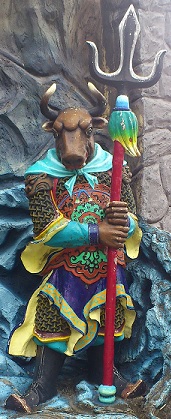
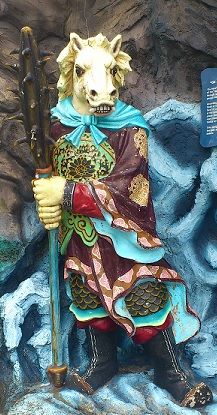
The ten kings of hell quickly straightened their clothes and came out. Seeing Wukong’s enraged expression, they immediately presented themselves in a line and called out, “Master Immortal, please state your name!” Wukong said, “You don’t even know who I am, yet you dare send collectors after me?” The ten kings said, “We would not dare! The sender must have made a mistake.” Wukong said, “I am the heaven-born sage of Shuilian Cave on Huaguo Mountain, Sun Wukong. What manner of official are you?” The ten kings bowed and said, “We are the rulers of the underworld, the ten kings of hell.” Wukong said, “State your names, that I might spare you!” The ten kings said, “We are King Qinguang, King Chujiang, King Songdi, King Wuguan, King Yanluo, King Pingdeng, King Taishan, King Dushi, King Biancheng, and King Zhuanlun.”13 “How can those who have all been promoted to kingship be so careless in their judgement?” Wukong said. “I, Old Sun, have cultivated immortality and mastered the Way, I have life equal to the heavens, I have transcended the three realms and escaped the five phases; why have collectors been sent for me?” The ten kings said, “Master Immortal, do not be angry. There are many people in the world with the same name, perhaps the collector has made a mistake?”
Bullshit!
胡说!or 胡说八道!for emphasis, is a great way to say “Nonsense!” or “Rubbish!” in a slightly ruder way.
Wukong said, “Bullshit! ‘Officials and clerks can be mistaken, but the collector is never mistaken.’ Bring out the register of life and death and let me see it!” The ten kings had no choice but to invite him into the palace to examine the register.
Still holding his Gold-banded Staff, Wukong climbed the steps of Senluo Palace and sat in the middle of the hall. The ten kings ordered the record-keeper to bring out the register. The magistrate didn’t dare hesitate. From the records room, he brought out five or six volumes, detailing the lifespans of the ten types of animals, for Wukong to examine one by one. Hairless beasts, furred beasts, feathered beasts, armored beasts, scaled beasts – none of these contained his name. He then came to the simian-type animals. For you see, although this monkey resembled a human, his name wasn’t listed with the humans. He did not live in the kingdom of the hairless beasts, nor was he ruled by the qilin like walking beasts, nor was he under the phoenix’s jurisdiction like flying beasts.14 There was separate register for the simians, which Wukong inspected. He came to soul number 1350: Sun Wukong, heaven-born stone monkey, destined lifespan 342 years, a peaceful end. Wukong said, “I don’t know how many years I have lived. Just erase my name altogether. Bring a brush!” The record-keeper quickly brought a brush and dipped it in ink. Wukong took the book of simians and crossed out all of the names that he saw. Throwing down the book he said, “That’s it! The monkeys aren’t your business anymore!” Wielding his staff, he fought his way out of the Peaceful Realms. The ten kings didn’t dare get in his way, but went to Green Cloud Palace and presented themselves to the Womb of the Earth Bodhisattva,15 where they discussed how they might report this incident to heaven.
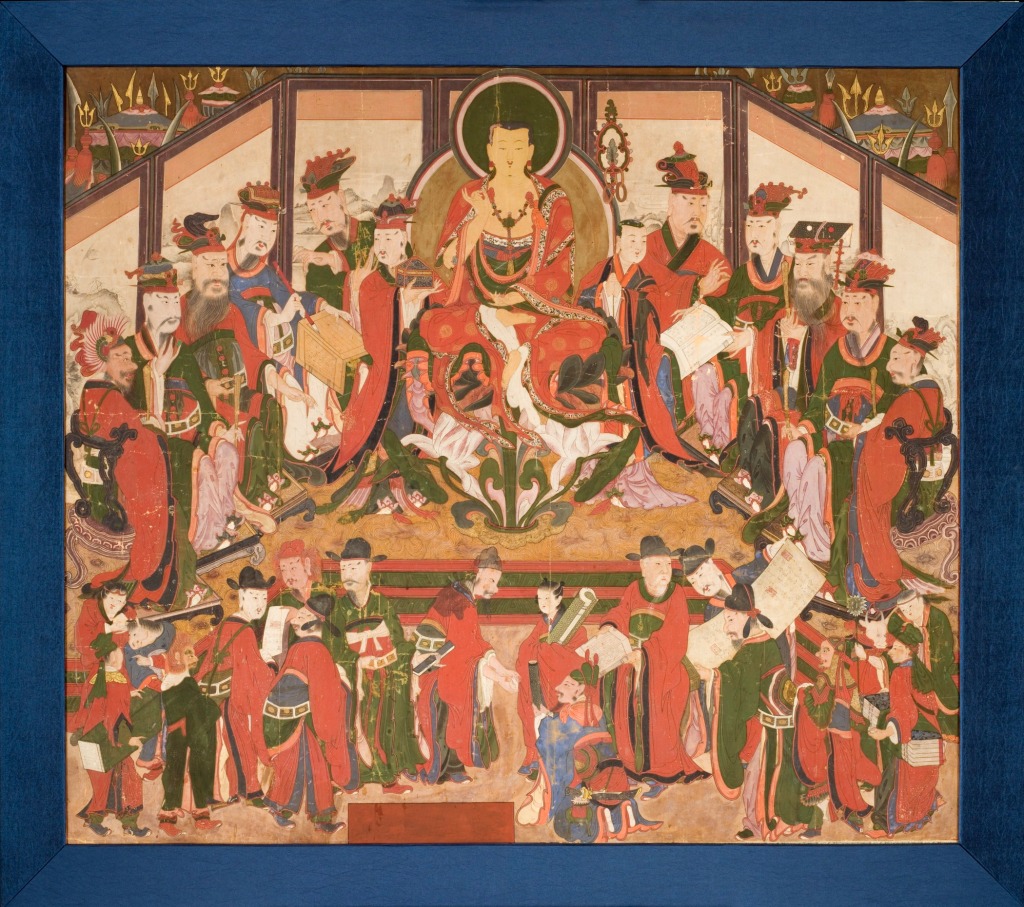
Having fought his way to the edge of the city, Wukong tripped over a clump of grass, fell, abruptly woke up, and found that it was all a dream.16 Stretching and half asleep, he heard the four old generals and monkeys all around him say, “Your Majesty, how much did you drink? You slept all night, won’t you wake up now?” Wukong said, “Never mind my sleeping. I dreamt that two people came to collect me and brought me to the gate of the Peaceful Realms, where I woke up. Using my magic, I went straight to Senluo Palace and argued with the ten kings of the underworld. I inspected the register of life and death and crossed out all of our names. The Underworld has no authority over us anymore! The monkeys knelt and bowed in awe and gratitude. From then on, many mountain monkeys never got old, for their names are not in hell’s register.
After the Handsome Monkey King had recounted these things, the four old generals reported it to the yao lords of mountain, who all came to congratulate him. Before long, the six brothers also came to congratulate him. Of the joy and feasting that came after the brothers heard how Wukong had erased the names from hell’s register, we won’t go into detail.
1 In Chinese, this phrase 放下心 literally means ‘to set down (one’s) heart’. ↩
2 A 蛟 jiao1 is a local water spirit in the form of a dragon, less powerful than 龙 long2 such as the dragon kings. ↩
3 A large mythological bird that can turn into a giant fish. ↩
4 Not really sure about this one. Prof. Yu translates this as a lynx. ↩
5 A 禺䝞, or 𤟹狨, seems to be a bird with a monkey’s head. ↩
6 About the distance from Los Angeles to New York City. ↩
7 Chicago to New York City ↩
8 Los Angeles to Los Vegas ↩
9 幽冥界 invokes a dark, gloomy, quiet, world in a meditative, hypnotic trance. ↩
10 He is not the only king of the underworld, as you’ll soon see, but he is the most famous. ↩
11 五行 is usually translated as Five Phases, which is a complicated Buddhist concept that I don’t really know that much about. ↩
12 Oxhead and Horseface are either two spirits or two types of spirits play a Charon-like role in Chinese mythology. ↩
13 Hoooooo boy. The mythology here is a mix of Buddhism, Taoism, and Chinese folklore. What complicates things more is that other East and Southeast Asian countries have adopted and adapted their own version of this underworld. There’s not really a canon version of these characters, but it seems like the dead will be judged by each of these kings in turn before reincarnating. Each king judges for particular vices and virtues. I’ve just transliterated them here because while for some kings it’s clear from their names what their roles are, it’s not clear for others. Trying for consistency here. ↩
14 I realize the text only lists six types of beasts. I have no idea what the other four would be. ↩
15 地藏王菩萨, or Kṣitigarbha, is yet another fascinating cross-cultural deity. He’s a kind of a patron saint of the dead. ↩
16 南柯一梦 is an idiom meaning ‘a dream of Nanke’, referencing a Tang Dynasty short story set in 794AD about an officer who dreamt a whole life before waking up and realizing only a single night had passed. ↩